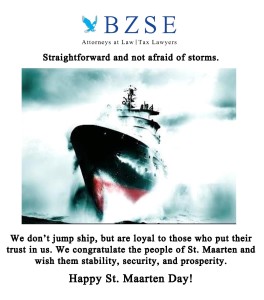TRADE-BASED MONEY LAUNDERING
More Trade Transparency Units Needed
Smuggling and trade fraud are on the rise, according to Viêt Nam News (27 October 2015). The Telegraph reports that the authorities in China have arrested 21 people on suspicion of defrauding almost one million Chinese investors of 50bn yuan (£5.3 billion) after an online peer-to-peer lender turned out to be a giant Ponzi scheme (1 February 2016). Money laundering and fraud seem to be on the increase. Trade-Based Money Laundering (TBML) is one of the big threats facing us today.
According to Premium Times (21 December 2015; Read the rest »
DISCHARGING THE MANAGEMENT BOARD
Only for matters evident from the accounts
The shareholders of a Dutch Caribbean limited liability company (NV or BV) may provide a discharge (décharge) to members of the management board for matters evident from the annual accounts, or matters otherwise made known to the general shareholders meeting. This is a standard item on the agenda for shareholders meetings at which a company’s annual accounts are adopted.
The aim of this discharge is that the company generally has no longer a legal cause of action against a management board member.
The effect of a discharge is limited. A discharge does not …
Read the rest »
INTERNATIONAL ARBITRATION IN THE DUTCH CARIBBEAN
The UNCITRAL Model Law is applicable
Parties with a legal dispute can turn to the public court system to settle the dispute; however, instead of bringing a lawsuit in a public court, they can also opt for arbitration. Arbitration is a form of private dispute settlement in which the parties instruct one or more persons (arbitrators) to render a binding decision on their dispute. The arbitrators may be jurists, but they can also be laypersons. People with specific expertise or experience in a certain branch or industry are often chosen as arbitrator.
Parties can include a so-called arbitration clause in …
Read the rest »
UN PROSPERO AÑA NOBO 2016
Een voorspoedig Nieuwjaar
Un Próspero aña nobo
A Prosperous new year
Un próspero Año Nuevo
.
.
MAKING FUN OF LAWYERS
Makes me smile…
The image that people have of lawyers is usually determined by coincidences. This may be a personal experience with their own lawyer or that of the counterparty. But even more will the image be determined by the relatively small group of lawyers who get publicity.
A. Pitlo (Evolutie in het privaatrecht, [Evolution in private law] Groningen: H.D. Tjeenk Willink 1972, p. 102) speaks with regard to certain lawyers about the ‘half-intellect’ that by intellectualism must succeed in being kept up towards the masses. Publications that are extremely critical of lawyers can date from any time and the first …
Read the rest »
THE GOOD, THE BAD AND THE BOSS
Three different personas during testimony
There are matters to consider before you enter a courtroom as plaintiff, defendant or witness: for instance, what you say, your body language, how you present yourself and what you wear. The judge will be watching you. You don’t believe me? Read for yourself!
The judge about the defendant:
Murdock tried out three different personas during his testimony. During his deposition, he showed the true force of his domineering personality. During the first day of trial, Murdock tried to appear more reasonable and conciliatory on direct, but on cross-examination, he could not resist being combative. He denied …
Read the rest »
KAREL FRIELINK FULL MEMBER OF STEP
Trust and Estate Practitioner
The Society of Trust and Estate Practitioners (STEP) was founded in 1991 by George Tasker as a hub for local forums of practitioners. STEP is the international professional body for those who work in the trust industry and the (often overlapping) field of estate administration. Its members are mainly solicitors, barristers, attorneys, accountants, trust officers and trust administrators as well as banking and insurance professionals in the trust field.
The main focus of the organization is to administer the examination process to ensure the quality of the membership, to provide educational and networking opportunities …
Read the rest »
THE DUTY OF CARE OF BANKS
Banks are under the obligation to exercise due care
In the Dutch Caribbean, no separately defined body of law exists with regard to the relationship between a (commercial) bank and its customer. The standard general terms and conditions applied by banks in the Dutch Caribbean have an important function in the legal relationship between banks and their customers. They enter into effect once explicitly or implicitly accepted by the customer.
According to most general conditions “the bank shall exercise due care on rendering its services. In doing so the bank shall reckon to the best of its ability with the client’s interests, …
Read the rest »
LIABILITY OF COMPANY DIRECTORS
No derivative suit
It is considered a general rule of Dutch Caribbean corporate law that the management board (a.k.a. board of directors) must act in the best interests of the company (an NV or BV) in the performance of its duties, even when acting on instructions from others (e.g. shareholders). This includes the interests of the shareholders, the employees and, according to most legal writers, the creditors of the company.
Under the Civil Codes of Curacao, St. Maarten and the BES-islands (Bonaire, St. Eustatius and Saba), directors of a limited liability company (naamloze vennootschap or besloten vennootschap) are personally and …
Read the rest »
BZSE – ST. MAARTEN DAY AD
No ship-jumpers!
Have you seen our ad in the newspaper earlier this week?
(13 November 2015)
.
SHAREHOLDER APPROVAL REQUIRED FOR SELLING ALL ASSETS
In particular circumstances this rule may be set aside
Generally speaking, the management board of a company (NV or BV) is not entitled to sell the company’s business or a substantial part thereof, without the approval of the shareholders’ meeting. The Enterprise Chamber of the Court of Appeal in Amsterdam confirmed this in its decision of 27 February 2014 (ECLI:NL:GHAMS:2014:597; JOR 2014, 160). According to the Court, (the managing board of) a legal entity that intends selling all shares in its subsidiaries must observe the requirements for adopting a resolution to liquidate that entity.
According to Section 2:7(2) of the Civil …
Read the rest »
LEGAL DOCUMENTS ARE HARD TO READ DUE TO LEGALESE LANGUAGE
Lawyers must learn to communicate with their clients
Communication skills are particularly important for lawyers. On the one hand lawyers have to accurately debate legal issues with like-skilled/trained people and on the other hand they have to explain all this to people without any legal education, many of which are vulnerable. That is not as easy as it sounds: legalese vs plain language.
I know that many people are dissatisfied and frustrated by lawyers’ communication efforts. I asked one of my networking contacts what she could teach a lawyer / attorney. Her response:
“I have worked with lawyers in my …
Read the rest »





